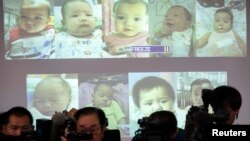In Thailand, there are new developments in the unusual case of a Japanese businessman who is believed to have fathered at least 15 babies through local surrogate mothers. The mothers are now trying to regain custody of some of the children who were taken by the state.
Thailand's social development and human security ministry is denying allegations that some infants in its custody are being treated improperly.
That is alleged in a lawsuit filed in December by nine Thai surrogate mothers, who also claim authorities are preventing them from seeing their children.
The babies were allegedly fathered by a wealthy 24-year-old Japanese businessman, Mitsutoki Shigeta.
The sensational case cast into the spotlight Thailand's shadowy surrogacy industry, which has become a magnet for foreigners seeking to become parents by paying local women to carry and give birth to their children.
The director of an Australian non-profit group, Families Through Surrogacy, Sam Everingham said it would be appropriate for the children to be removed from government custody.
“If the father is not appropriate then being with the surrogate mothers is really the ideal situation. But we want to stress that this is an unusual case. And parents who have got current arrangements in Thailand shouldn’t be concerned about this for their own surrogates,” said Everingham.
The Shigeta case, along with the publicity resulting from a surrogate baby with Down Syndrome being left behind in Thailand by an Australian couple, prompted the government to crack down on the thriving commercial surrogacy industry last year.
The kingdom's legislature, appointed by the military-controlled junta, also is considering a new law that would impose a ten-year prison sentence for anyone convicted of involvement in paid surrogacy.
Surrogacy advocates, such as Everingham, lament how the extreme cases that drew international headlines have led to the new restrictions.
“The case of Mr. Shigeta was a pretty appalling example of abuse of international surrogacy by foreigners. And it’s one of the reasons which led to the acceleration of the closure of access to surrogacy in Thailand by foreigners,” said Everingham.
Thailand, due to low cost and availability, was a preferred destination for surrogacy arrangements, especially by same sex couples, Everingham said.
“Many countries, such as Australia, don’t provide easy access to surrogacy. These states don’t allow commercial arrangements. They don’t allow paid advertising for surrogates so it’s very hard to connect with a surrogate in many states in Australia and even in many states in the U.S. So it forces many, many people offshore,” he said.
Thai officials say they are in the process of determining whether the surrogate mothers of the children now in the care of the state are suitable to take custody of them.
Public prosecutors have postponed until February 17, pending further information from police, a decision on whether to indict a physician linked with the Japanese businessman.




